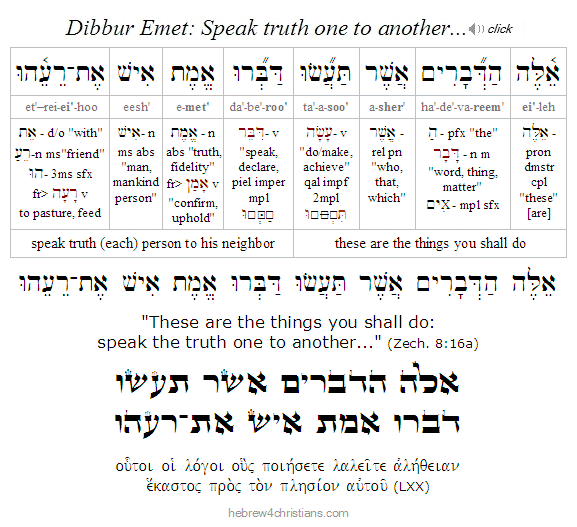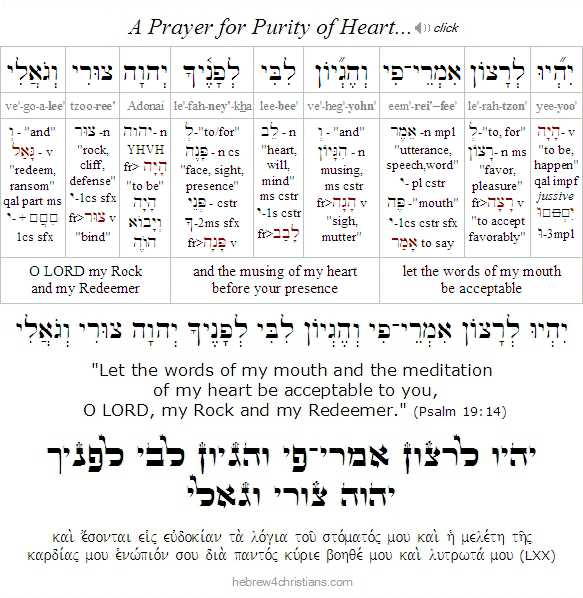|
The Torah of "speaking truth," of being honest and upright (i.e., yashar: יָשָׁר) with ourselves and others, is called dibbur emet (דברי אמת) in Hebrew. Dibbur emet, or speaking truth, is the duty to use words and language with integrity and justice. "These are the things you are to do: speak truth (דַּבְּרוּ אֱמֶת) to one another; render in your gates judgments that are true and make for peace!" (Zech. 8:16; see also Lev. 19:11; Eph. 4:25, Col. 3:9, among other verses). Note that dibbur emet also forbids spreading gossip, sharing worthless news reports, expressing contempt, mockery, or outrage over the viewpoints of others, and so on. An honest person doesn't play games with words but understands that communication is a sacred trust. Our words are to be regarded as sacred, as an expression of truth. God has made us inviolable promises, and just as His word is sacred, so should we strive to be sacred in our speech, too (Matt. 5:37).
Hebrew Lesson
Zechariah 8:16 Hebrew reading (click):
Our ability to use language and reason is essential to the image of God within us, and evil speech, or lashon ha'ra (לָשׁוֹן הָרָה), consequently profanes and corrupts the soul. Therefore the sages identify a metzora (i.e., leper) with hamotzi ra, "one who brings forth evil," and they stress shemirat ha-lashon (שְׁמִירַת הַלָּשׁוֹן), or "guarding of the tongue," as a central virtue of the righteous. In Jewish ethical thinking, speaking the truth must be contextualized with good will and kindness, and this implies that purposely saying something that to shame another person is forbidden. Some of the sages, such as the Chofetz Chaim, have gone so far as to say that you are forbidden to say anything evil about a person even if it is true. There are exceptions to this rule, of course, for example in legal proceedings when eye-witness testimony that a crime was committed is required for the sake of justice, but in general the sages recommend avoid saying anything gratuitously negative about others by using the good eye to look for their good qualities...
Our Lord went well beyond these requirements and told us that whatever is spoken in this life is "echoed" throughout eternity and will be reheard upon the day of judgment: "I tell you, on the day of judgment people will give account for every careless (ἀργὸν) word they utter, for by your words you will be justified, and by your words you will be condemned" (Matt. 12:36-37). Our words, especially the words of our heart, are as prayers spoken to heaven. We are especially warned against making promises we might break: "Let what you say be simply 'Yes' or 'No'; anything more than this comes from evil" (Matt. 5:37). All this implies that our thinking, which is expressed in our words, must be sanctified as well. We have a duty to think clearly and righteously, and therefore evil and fearful thoughts are forbidden as well ...
"Come, O children, listen to me; I will teach you the fear of the LORD. What person is there who desires life and loves many days, that he may see good? Keep your tongue from evil and your lips from speaking deceit. Turn away from evil and do good; seek peace and pursue it" (Psalm 34:11-14). Fearing the LORD means being filled with the wonder of the Divine Presence. The one who fears the LORD will "see good," that is, he will see the goodness of his surroundings in the light of God's Presence. Seeing the good in others, using ayin tovah (a good eye), is therefore the contrary of lashon hara, or slander. Our words should be used to upbuild, edify, and esteem others, not to tear them down. Lashon hara is evidence, then, of a critical spirit, an evil eye, and a suspicious heart. We must look to God for the miracle of seeing the truth of His goodness in all things.
"Set a guard, O LORD, over my mouth; keep watch over the door of my lips" (Psalm 141:3). Those who think it easy to control the tongue have likely never really tried to do so. "The tongue is a small member, yet it boasts of great things. How great a forest is set ablaze by such a small fire! And the tongue is a fire, a world of unrighteousness. The tongue is set among our members, staining the whole body, setting on fire the entire course of life, and set on fire by hell" (James 3:5-6). Ultimately, controlling your tongue is a matter of controlling your inner thoughts, your heart, and your attitude, called shemirat ha-lev (שמירת הלב). Therefore we are admonished to be "quick to hear, slow to speak, slow to anger," since the anger of man never works the righteousness of God (James 1:19). May the LORD our God help us always to speak with grace, "seasoned with salt" (Col. 4:6); and may we all "speak the truth in love to grow up in every way" (Eph. 4:15). "Let my words and the meditation of my heart be acceptable to you, O LORD, my Rock and my Redeemer" (Psalm 19:14). Amen.
Hebrew Lesson
Psalm 19:14 Hebrew reading (with comments):
|




